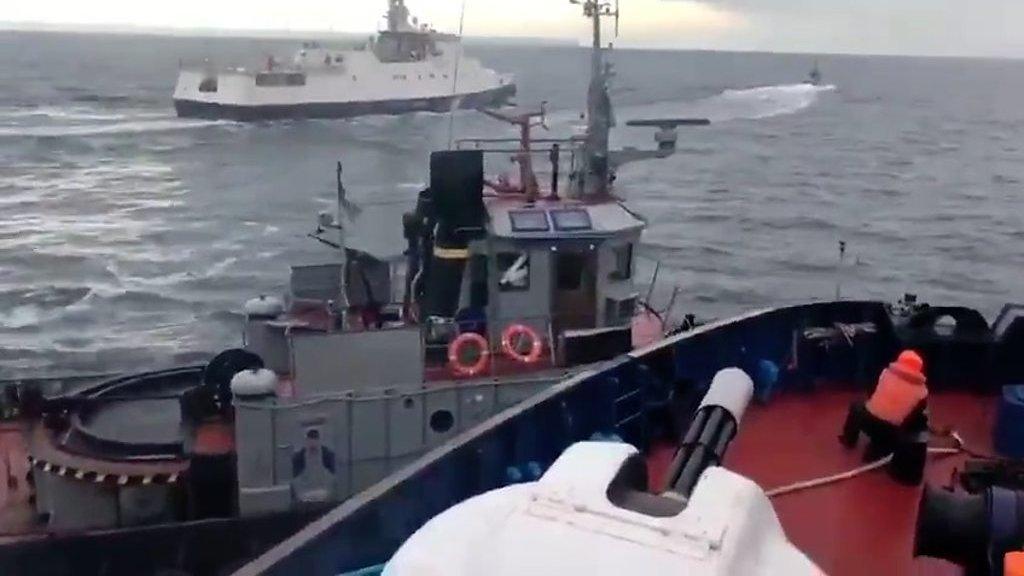Ukraine-Russia sea clash staged, says Putin
- Published
Why tensions between Russia and Ukraine are so high
Russian President Vladimir Putin has accused Ukraine's leader, Petro Poroshenko, of trying to boost his ratings ahead of 2019 elections with a naval confrontation off Crimea.
Russian FSB border guards opened fire on two Ukrainian gunboats and a tug before seizing the Ukrainian crews.
"He had to do something to make the situation more tense," Mr Putin told an investment forum on Wednesday.
Ukraine has condemned the incident as a Russian "act of aggression".
The EU has expressed "utmost concern about the dangerous increase of tensions" and said Russia's use of force was "unacceptable", but did not mention any new sanctions.
What happened off Crimea?
At least three of the Ukrainian sailors were wounded on Sunday as tensions spilled over near in the Kerch Strait, the passage between the Black Sea and the Sea of Azov off the coast of Crimea.
The peninsula was seized from Ukraine in 2014 and annexed by Russia shortly afterwards.
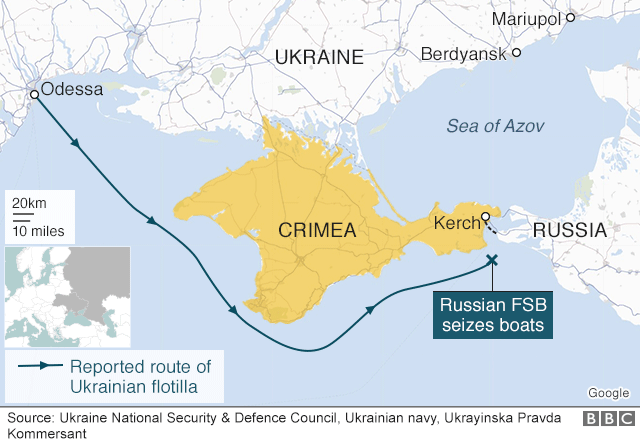
The three boats were sailing from Odessa to Mariupol, a major Ukrainian port on the Azov sea, when they were confronted by four FSB vessels.
Both countries agreed to share the sea in a 2003 treaty, but Russia's decision to open a bridge across the Kerch Strait this year has exacerbated tensions.
Ukraine says Russia is deliberately blockading Mariupol and another port, Berdyansk, preventing ships from getting through the Kerch Strait.
All 24 captured Ukrainian sailors have now been given two months in pre-trial detention by a court in Russian-annexed Crimea.
What did Putin say?
"It is undoubtedly a provocation," the Russian president said, adding that it was organised by Ukraine's authorities "and, I think, the incumbent president in the run-up to the Ukrainian presidential election in March 2019".
Mr Poroshenko has low popularity ratings, with polls this month suggesting about 10% of voters plan to vote for him next year and nearly 50% saying they would not vote for him under any circumstances, external, the Kyiv Post newspaper reported.
Mr Putin added that the Ukrainian president's decision to impose martial law after a mere "border incident" had not even taken place at the height of the conflict with pro-Russian separatists in eastern Ukraine in 2014.
He insisted that Russia's military response was appropriate as the Ukrainians had "trespassed" into Russia's territorial waters, arguing that even before Crimea was annexed they were Russian waters.
Ukrainian officials published a map on Wednesday, external, placing all three Ukrainian boats just outside Crimea's territorial waters at the time they were seized.
"This political froth will die down," Mr Putin suggested, hours after Russia announced that it would send a new S-400 surface-to-air missile system to Crimea next month, to join the three already deployed this year.

The law won't help Putin
By Jonathan Marcus, defence and diplomatic correspondent
For the Kremlin, this is as much a battle of narratives as a physical confrontation between patrol boats in the approaches to the Kerch Strait.
Russia is asserting that the Ukrainians were engaged in a simple provocation. But a detailed narrative of events published by the Ukrainians, and reviewed by Western officials, suggests a very different story.
The episode began in the early hours of the morning of 25 November with a Ukrainian gunboat calling up the Russian authorities and notifying them of its plans to pass into the Sea of Azov.
The Ukrainian vessels were subsequently fired upon and seized some 18 hours later while returning to Odessa after abandoning their plans to transit the strait.
Russia insists that law is on its side but the coast off Russia-annexed Crimea remains legally Ukrainian waters and the two countries have a longstanding agreement providing each with access to the Sea of Azov.

How has Ukraine reacted?
Martial law is being implemented across Ukraine's border regions for 30 days in response to the crisis.
The decision, backed by parliament, affects 10 Ukrainian border regions, and the Ukrainian leader made clear in a TV interview he thought the country was under threat of "full-scale war with Russia".
The state border service said it had been put on full combat alert and a number of other potential restrictions could be imposed.
Ukraine-Russia sea clash: Are Ukrainians worried?
Mr Poroshenko initially called for a 60-day period of martial law but when domestic critics suggested he wanted to delay the March 2019 presidential vote he halved the period, so that "it will not overlap for one day with the start of the election campaign".

Why is Poroshenko on a war footing?
By Jonah Fisher, Kiev
Ukraine's President Petro Poroshenko is talking up the possibility of war.
In a series of media interviews with both international and domestic TV channels his message was clear: Russia is preparing an attack and Ukraine must get ready.
It's hard for Mr Poroshenko to lose in that position. If war starts, he saw it coming. If it doesn't, his actions have averted it.
Martial law has been introduced in the parts of the country closest to Russia. Declaring martial law sent a strong message but in practice it looks like changing very little on the ground. For now at least, border crossings remain open and life continues as normal.

Western governments have backed the Ukrainian argument and US President Donald Trump has said he may cancel a planned meeting with Mr Putin on the sidelines of the G20 summit in Buenos Aires later this week.
"Maybe I won't even have the meeting. I don't like that aggression. I don't want that aggression at all," he told the Washington Post.
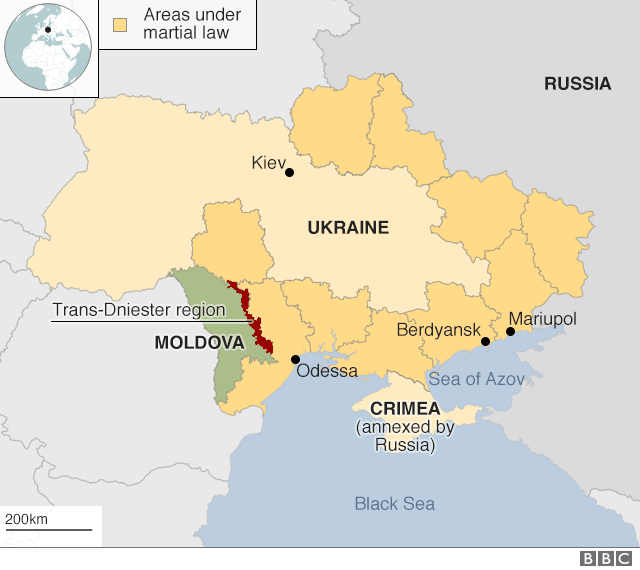
- Published28 November 2018
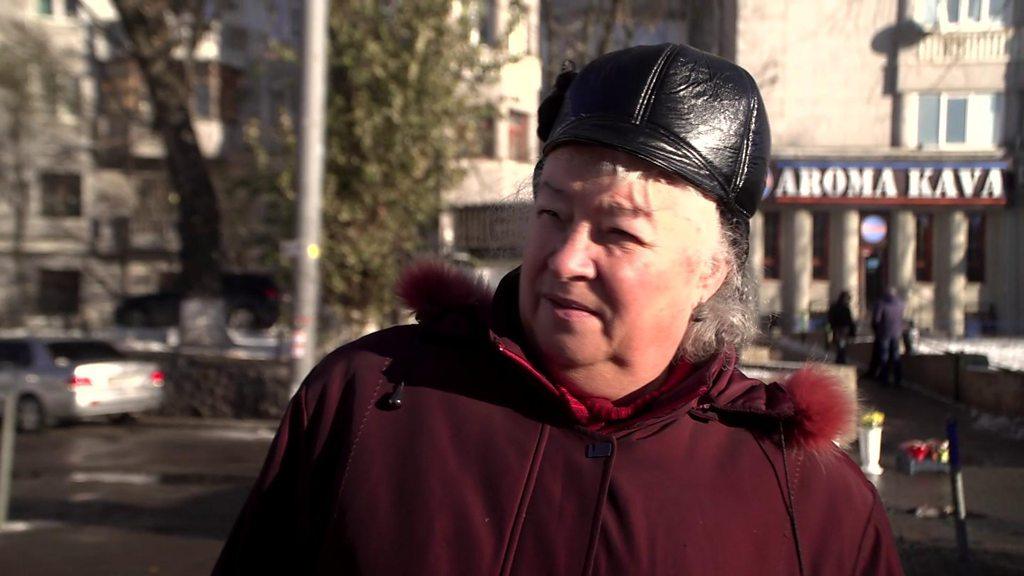
- Published27 November 2018
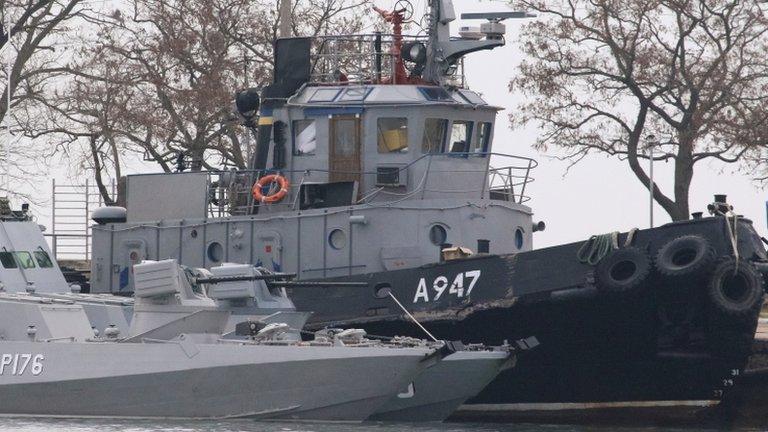
- Published26 November 2018
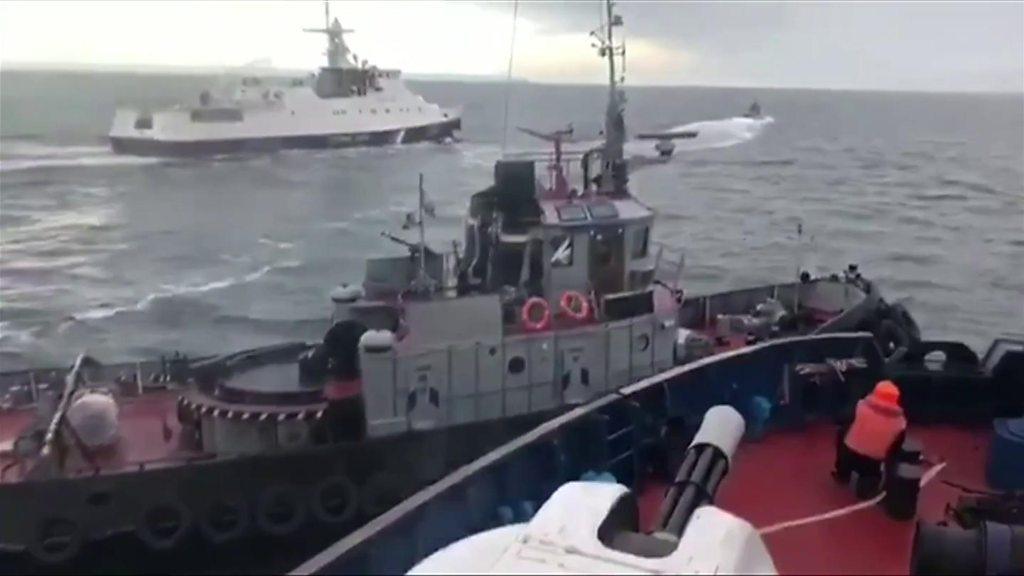
- Published27 November 2018
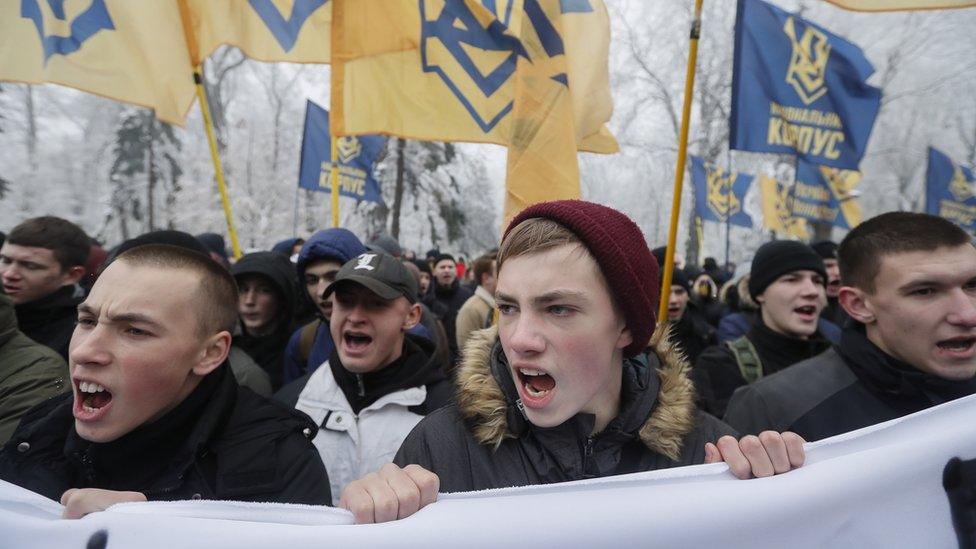
- Published26 November 2018
